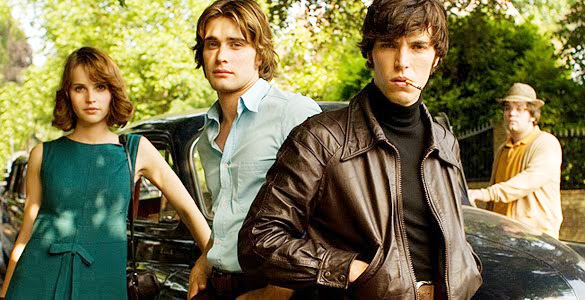When talking about their favourite films, Ricky Gervais and Stephen Merchant (The Office, Extras) tell of their thoughts on why the US had the market cornered on coming-of-age pieces of cinema, such as American Graffiti, period pieces that didn’t come with corsets and weighty language but instead took a nostalgic look at an era still fresh in most minds. They wondered why there was no British slice of Americana, or slice of Britannia if you will, which would reflect on those colourful times and be looked on fondly. These questions led to them co-writing and directing Cemetery Junction, which takes its story of three friends on the cusp of the rest of their lives and sticks it in the 1970s, hoping to balance the scales a little.
1973 is the year, to be exact, and the sleepy town which makes up the film’s title is the location. The three friends, Freddie (Christian Cooke), Bruce (Tom Hughes) and Snork (Jack Doolan), have spent their time generally doing what young men do, drinking, fighting and chasing women with varying degrees of success. Now in their early 20s, Freddie has decided the time has come to leave those days behind and start a respectable career as an insurance salesman while trying to possibly rekindle things with his boss’ daughter Julie (Felicity Jones), eager not to end up like his father (Gervais), who has worked in a factory his entire adult life with no chance of change. Bruce, on the other hand, wants to continue drinking and fighting whilst bemoaning his seemingly deadbeat dad, rebelling against everything and promising that he is leaving. Snork (so named because of his resemblance to the character in TV show The Banana Splits) is somewhere between the two, not stuck in a factory but also with no real long-term plans, happy enough to follow the others.
Cemetery Junction is less about the period setting though, more about friendship and the time in every person’s life where they define who they will become for the rest of it. Gervais and Merchant paint a particularly damning picture of suburban life, where people are stuck in the same nine-to-five routine, loveless relationships and with, at the end of it all, the prospect of some empty ornament to show for it. They are keen to say that life is about living, make the wrong choices and it will pass you by.
Overall, they accomplish what they have set out to say. Though the message can occasionally be blunt, it is helped by some wonderfully subtle scenes. Those between Freddie’s boss Mr Kendrick (Ralph Fiennes) and his wife (Emily Watson) are particularly affecting. He the archetypal, successful bread-winner, she the dutiful wife and no more to him than a painting hung in the hallway. Watson in these scenes shows more with a sorrowful look than most of the rest of the film, strong enough to withstand the later expository dialogue which threatens to undermine it.
It is these little moments where the film peaks, such as a speech at the annual Winner’s Ball (a celebration of the best insurance salesmen that year) in which Mr Kendrick is delightfully unaware of the irony dripping off his every word, those with Bruce’s father which are tinged with regret and an early scene where Freddie’s salesman mentor Mike (Matthew Goode) is shown as having the ability to sell sand to a camel.
The grander scheme of Cemetery Junction can be heavy-handed, the 70s setting comes and goes from being unobtrusive wallpaper to all-too-obvious afros, Crazy Horses and casual prejudices, which can jar from the narrative. While the cast give great performances almost without exception, some characters feel out of place or unrealised. Brian the Cafe Owner, for instance, would be more suited to a sitcom or a sketch show.
Despite the odd bump, there is a sweetness to the film that means only the most hardened cynic would describe it and the climax as formulaic. It is redemptive and all the main protagonists have completed arcs, which is what you want from a picture such as this. Gervais and Merchant may not have redefined cinema, but they’ve definitely added a little weight to the scales.
7 out of 10
What did you think of Cemetery Junction?


